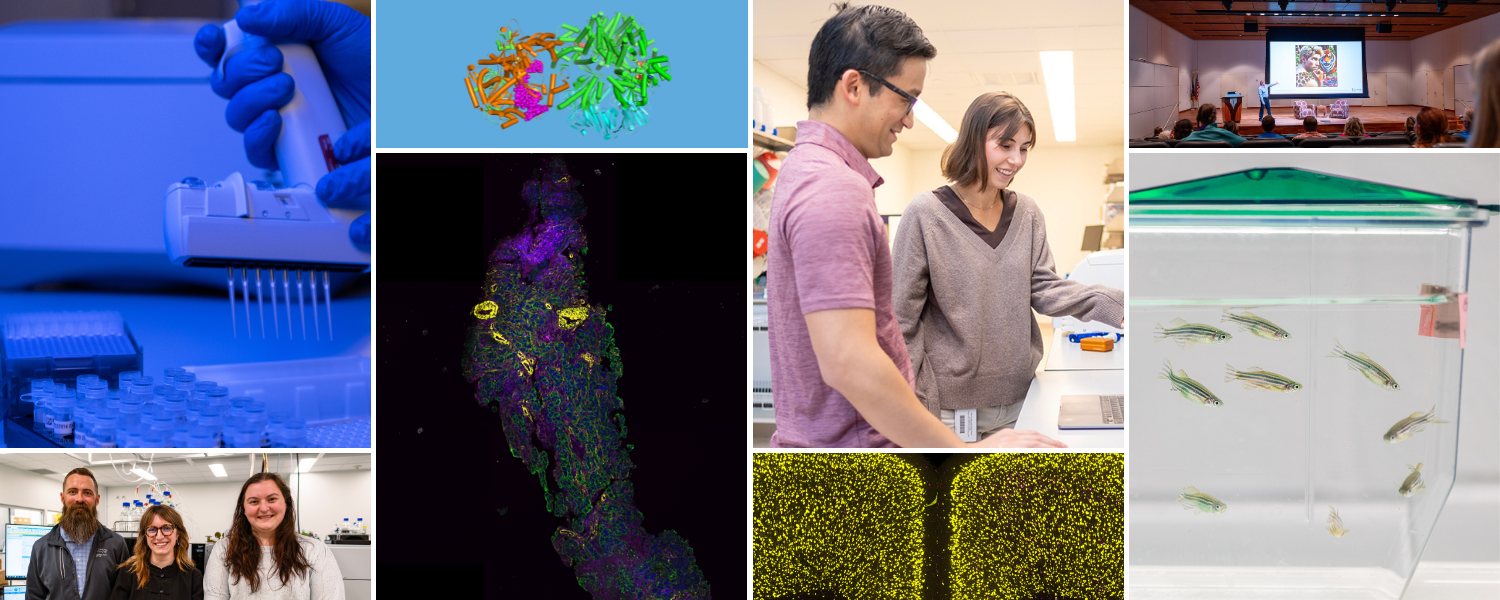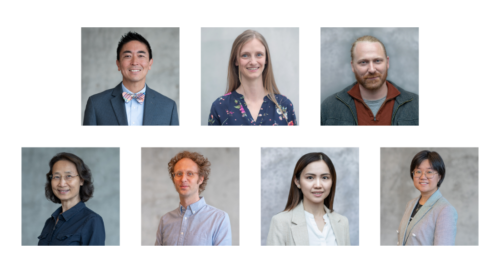VAI Research: A year in review
December 16, 2024

The past year at Van Andel Institute can be summed up in two words: “growth” and “impact.”
We’ve expanded our research capacity by adding new labs, deepened our exploration of health and disease and pursued potential new therapies for cancer and Parkinson’s. We continue to advance our mission to improve human health by nurturing the next generation of scientists and conducting cutting-edge research.
Read below to learn more about our accomplishments in 2024.
Building our research expertise
In 2024, we welcomed seven new faculty and their labs. These exceptional scientists explore the foundations of health with an eye toward better understanding and treating disease.
Top row (from left): Dr. Cho, Dr. Hoyer, Dr. Janssens. Bottom row (from left): Dr. Li, Dr. Walton, Dr. Yang, Dr. Zhang.
- Clifford Cho, M.D. | Professor, Department of Cell Biology
Dr. Cho is a surgeon-scientist whose pioneering discoveries have led to FDA approval of histotripsy as a cancer treatment. Histotripsy uses ultrasound waves to disrupt tumors and elicit an immune response, which helps the body better fight cancer cells. He is a professor in Van Andel Institute’s Department of Cell Biology, chief medical officer of University of Michigan Health-West and a professor at the University of Michigan.
- Melissa Hoyer, Ph.D. | Assistant Professor, Department of Neurodegenerative Science
Dr. Hoyer studies the fundamental cellular processes that support brain health. To date, her research has revealed important insights into several critical cellular systems required for normal function — and detailed how errors in these vital processes contribute to disease.
- Derek Janssens, Ph.D. | Assistant Professor, Department of Epigenetics
Dr. Janssens explores the factors that gives rise to blood cancers with the goal of informing improved diagnosis and treatment strategies. His research has contributed to powerful new methods that enable scientists to better study the complex factors that drive cancer development.
- Hong Li, Ph.D. | Professor, Department of Structural Biology
Dr. Hong Li uses the latest technologies to study RNA, an important molecule that not only helps carry out the instructions found in DNA but also facilitates the function of protein enzymes. Her leading-edge research has far-reaching implications for understanding the role of RNA in health and disease — and for informing new diagnostic and treatment strategies.
- Travis Walton, Ph.D. | Assistant Professor, Department of Structural Biology
Dr. Walton studies the cellular cytoskeleton, which provides structure and stability to cells. Problems with this critical architecture can contribute to a wide range of human diseases. Dr. Walton’s lab uses leading-edge imaging technologies to identify vulnerabilities in the cytoskeleton that can lead to novel diagnostic and therapeutic targets.
- Yang Yang, Ph.D. | Assistant Professor, Department of Structural Biology
Dr. Yang employs the latest imaging technologies to illuminate new insights into neurodegenerative diseases such as Parkinson’s and Alzheimer’s. Her research has revealed the structures of critical disease-related protein filaments — an important step toward developing improved treatments.
- Liman Zhang, Ph.D. | Associate Professor, Department of Structural Biology
Dr. Zhang studies the multifaceted ways that the immune system responds to infection and cancer. By focusing on the role of inflammation in these nuanced interactions, Dr. Zhang hopes to inform improved treatments for cancer and other disorders.
In addition to recruiting new faculty, we also celebrated several VAI scientists who were recognized for their outstanding research:
- VAI President and Chief Scientific Officer Dr. Peter Jones was elected to the National Academy of Medicine, a recognition that is considered one of the highest honors in the fields of medicine and health.
- VAI named Dr. Peter W. Laird as the Peter and Emajean Cook Endowed Chair in Epigenetics and Dr. Huilin Li as the Ralph and Grace Hauenstein Endowed Chair in Structural Biology.
- Russell Jones and Peter W. Laird were included in the 2024 Clarivate Highly Cited Researchers list, a distinction marking them as leaders in their fields.
- A trio of esteemed scientists from VAI and Johns Hopkins University received the Harvey Prize for their groundbreaking discoveries in cancer epigenetics.
Supporting clinical trials
Clinical trials are essential steps for moving potential new treatments from the lab to patient care. VAI supports this vital work through the Van Andel Institute–Stand Up To Cancer® Epigenetics Dream Team, which pursues new cancer treatments, and the Cure Parkinson’s–Van Andel Institute International Linked Clinical Trials Program, which seeks therapies that slow or stop Parkinson’s disease progression. This year, we saw promising results from a phase 2 clinical trial in Parkinson’s, funded the advancement of two early-stage Parkinson’s clinical trials and supported research to improve cancer immunotherapy.
- Phase 2 clinical trial of Type 2 diabetes drug for treatment of Parkinson’s shows positive and promising results
- Cure Parkinson’s and Van Andel Institute fund Phase 2 clinical trial of dapansutrile for Parkinson’s
- Cure Parkinson’s and Van Andel Institute announce funding for a phase 1 clinical trial of low-dose lithium in Parkinson’s disease
- Disrupting Asxl1 gene prevents T-cell exhaustion, improving immunotherapy
Connecting with the community through our Public Lecture Series
For the seventh year, we were pleased to host the VAI Public Lecture Series, which comprised five free, hour-long talks on the latest in research and K–12 education. We welcomed a record-breaking 1,953 people in 2024, who joined virtually and in-person to learn about the work underway at the Institute.
Missed the events? Not to worry — you can check them out below. If you would like information on our upcoming 2025 lecture series, please check here.
- The Science Behind Cancer and Nutrition
- When Good Proteins Go Bad — Pathology in Parkinson’s Disease
- How K–12 Educators are Navigating AI in Schools
- The Link Between Inflammation and Depression
- At the Crossroads of Immunity, Metabolism and Cancer
Making the most of metabolism
Metabolism is a cascade of chemical reactions that gives us the energy we need to live our day-to-day lives. When problems with metabolism occur, they can contribute to disease. Cancer cells, for example, thrive on stealing certain nutrients like fat from healthy cells to fuel their growth. A recent discovery by a team of VAI scientists in the Department of Metabolism and Nutritional Programming found that depriving cancer cells of these essential nutrients may improve treatment strategies.
Meanwhile, other scientists have focused on the complex relationship between metabolism and the immune system. By investigating immune cell function, they uncovered how immune cells can create an alternative route for producing an essential metabolite that fights cancer as well as how they can gather nutrients from other cells when the resources are low.
- Starving cancer cells of fat may improve cancer treatment
- Study finds persistent proteins may influence metabolomics results
- Immune cells have a metabolic back-up plan for accessing their anti-cancer playbook
- Immune cells swap snacks and trade information to do their jobs. Can we help them be more effective?
Understanding the genetic switchboard
Who we are is shaped in part by epigenetics, a complex set of processes that determine when and to what extent our genetic instructions are carried out. In the Department of Epigenetics, VAI scientists seek to understand how epigenetic changes may either protect or predispose us to complex diseases such as cancer and diabetes.
Some of this year’s epigenetic revelations illuminated new insights into cancer immunotherapy, showcased promise of combination cancer therapies and highlighted a new anti-cancer compound that inhibits cancer cell growth in a specific type of infant leukemia.
- New anti-cancer ‘degrader’ targets protein essential to infant leukemia
- New research aims to improve cancer immunotherapy
- For some endometriosis-related ovarian cancers, timing is everything
- Combining epigenetic cancer medications may have benefit for colorectal cancers and other tumor types
- ‘A Grand Plan’ for achieving breakthroughs and improving health
Visualizing the building blocks of biology
Just as humans rely on a skeletal system for protection and support, biological molecules have their own intricate structures that are essential for life. Scientists in VAI’s Department of Structural Biology are dedicated to understanding how the structure of molecules influence their roles in health and disease.
In 2024, VAI scientists harnessed the Institute’s cryo-electron microscopes to explore how the genetic code in DNA is copied and reveal weaknesses in tuberculosis, an ancient disease that still has devastating consequences today. Another team of scientists found that some proteins adjust their shape based on temperature, opening new opportunities for structure-guided drug development.
- When it comes to DNA replication, humans and bakers yeast are more alike than different
- Tuberculosis is an ancient problem. Modern technology is helping to solve it.
- Heating proteins to body temperature reveals new drug targets
Exploring the roots of neurodegeneration
More than 50 million people worldwide have a neurodegenerative disease such as Parkinson’s, dementia or ALS. With this number expected to increase as the population ages, there is an urgent need to develop treatments that slow or stop disease progression. VAI scientists in the Department of Neurodegenerative Science are doing their part to aid in this fight by investigating the factors that give rise to neurodegeneration.
In 2024, a team of VAI scientists uncovered a molecular “fingerprint” that marks cells vulnerable to Parkinson’s pathology. Others are investigating how genetics and epigenetics affect disease onset and progression.
VAI also welcomed hundreds of scientists and people with Parkinson’s to the Institute to discuss the latest Parkinson’s disease research as part of our annual Grand Challenges in Parkinson’s Disease symposium and Rallying to the Challenge meeting. In May, VAI expanded our efforts to tackle depression through research. We teamed up with Western Michigan University Homer Stryker M.D. School of Medicine and Western Michigan University as the newest joint members of the National Network of Depression Centers, a collaboration that hopes to translate cutting-edge depression research into actionable care.
- Exploring the brain’s intricate neuronal network
- Scientists identify cell vulnerability ‘fingerprint’ related to Parkinson’s, Lewy body dementia
- 3 big takeaways from Grand Challenges in Parkinson’s Disease
- Western Michigan University Homer Stryker M.D. School of Medicine, Van Andel Institute and Western Michigan University join the National Network of Depression Centers
Taking on cancer and rare diseases through a cellular lens
Our health, and consequently our lives, depend on the coordinated activities of our individual cells. VAI scientists pursue fundamental research to explore how our cells grow, communicate, survive, and much more to better understand how the activities of these cells become derailed and lead to disease.
For example, did you know that understanding how cells “talk” to each other could be the key to developing precision cancer treatments? Or that VAI scientists and collaborators have developed an experimental blood test that detects pancreatic cancer based on the sugars they produce?
These are a few things VAI scientists in the Department of Cell Biology have been up to this year.
- Experimental blood test improves early detection of pancreatic cancer
- Can a tiny fish help us cure cancer?
Grand impact for the Graduate School
Our Ph.D. program in molecular and cellular biology immerses students in research early on to promote a rigorous, problem-based learning experience. As a result, our students make outstanding contributions that advance our understanding of health and disease.
This year, we welcomed 12 new students to Van Andel Institute Graduate School.
View this post on Instagram
Strengthened by community
These accomplishments are a testament to the immense support we receive from our community. We are deeply grateful to every donor, volunteer, sponsor and supporter for believing in the work we do here at VAI. Your time, effort and generosity have been instrumental in driving the success of our Institute.
Looking ahead to 2025, we are excited to build on this momentum, push the boundaries of discovery and innovation, and foster hope for a brighter and healthier future for all.






